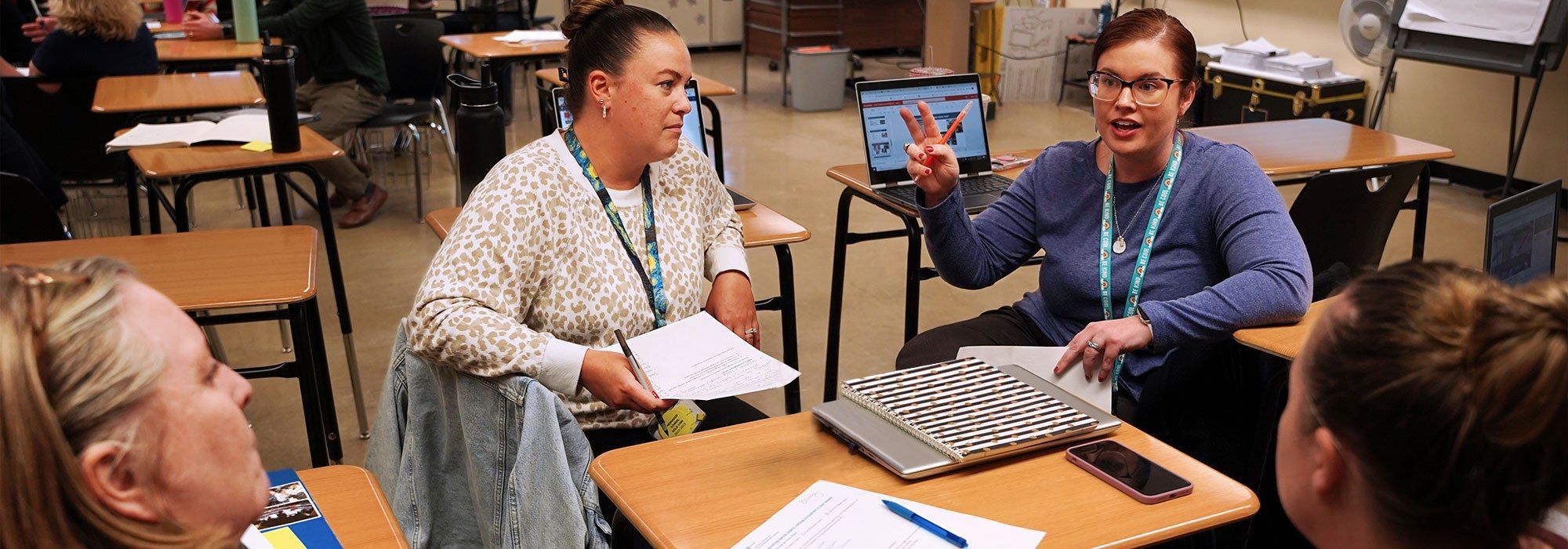Through research-based, nonpartisan professional learning, Penn State’s Hammel Family Human Rights Initiative assists preK-12 educators in investigating and responding to difficult issues in their classrooms and schools. The Initiative provides program participants with strategies and considerations for enhancing their teaching practice to foster the student development of crucial skills, including critical thinking, active listening, civic discourse and empathy.
Participating educators refine their pedagogical skills, while engaging in critical reflection to analyze their students, classrooms and communities through trauma-informed, asset-based and contextually responsive lenses. Through engaging in this collaborative professional learning, educators bolster classroom learning environments, supporting students
in constructing a more holistic understanding of difficult issues, thus empowering students to sharpen their perspectives while respecting others’.
Noelle Ackland, AP Literature teacher, shares her ideas and perspective in a small group discussion with Mark Avitabile (left), Director of STEM and Professional Learning, and Patti Pullin (9th and 10th grade Math teacher) in the Interboro School District during an inquiry community meeting facilitated by the Initiative. (Photo: John Pendygraft)
“I was talking with my first graders about the election, and they started expressing opposing views and having very explicit racial conversations at age six. I needed a way to unpack this difficult topic.”
B.H., first grade teacher in the Red Lion Area School District (Red Lion, PA)
Participating educators enjoy 360-degree support from Penn State’s unparalleled institutional resources and partners. The Initiative’s affiliated faculty contribute expertise in teaching difficult social and historical topics, use of media in the classroom, trauma-informed pedagogy, the Holocaust, gender studies, human rights violations, international law, art education and more. Educators connect with experts from the College of Education, the College of the Liberal Arts, Penn State Law, the Donald P. Bellisario College of Communications, the Center for Science and the Schools, the Jewish Studies Program, and the Humanities Institute. The Initiative’s external partners include the Pennsylvania Department of Education, the University of Southern California Shoah Foundation, the Anti-Defamation League, Echoes & Reflections, and the Holocaust Center of Pittsburgh.
Introduction & Overview Video of the Initiative
- Participants in human rights initiative share experiences with college students
- Penn State Human Rights Initiative faculty win mentorship, dissertation awards
- Faculty member's documentary about innovative teacher gets national distribution
- Innovative approaches for addressing difficult topics in K-12 schools
- Human Rights Initiative produces free online training about difficult topics
- How educator Gloria Jean Merriex used dance, drills and devotion to turn around a failing elementary school in a year
- Holocaust Education Initiative to share proof of its strong NEH program impact
- Human Rights Initiative director to conclude ‘Dialogues of Democracy’ series
- Schreyer Honors College to host yearlong 'Dilemmas of Democracy' program
- A Smarter Approach to the Hardest Topics (Penn Stater Magazine)
- Navajo Nation, Penn State team receive grant for Indigenous character education
- Alumni brothers hope their gift propels Penn State initiative battling hatred
- From ‘never forget’ to never mind? An Aspenite seeks to address Holocaust education (The Aspen Times)
- Foxboro charter school's Holocaust Stamps Project to open at Pennsylvania museum (The Foxboro Reporter)
The Initiative Bulletin
To subscribe to our quarterly Initiative Bulletin e-newsletter, please CLICK HERE. View our latest edition: Aug. 29, 2023
For more information about the Initiative and its programs as well as opportunities to get involved, email HolocaustEdInitiative@psu.edu
Follow Us on Social Media


